|
|
|
Sort Order |
|
|
|
Items / Page
|
|
|
|
|
|
|
| Srl | Item |
| 1 |
ID:
178675


|
|
|
|
|
| Summary/Abstract |
A wealth of literature argues that domestic institutions can sometimes restrain government repression. In this article, we highlight an institution tasked specifically with protecting and promoting human rights: the National Human Rights Institution (NHRI). Although common international standards exist, NHRIs exhibit substantial variation in their organization, the rights that they protect, the activities they permit, and the manner in which they appoint their members. Scholarship to date has conceptualized and measured NHRIs dichotomously; an NHRI either exists or it does not. We present data that highlights NHRI heterogeneity collected via content analysis of NHRI annual reports, NHRI websites, national constitutions, government legislation, and other sources. Using these data, we show NHRIs that can publish their findings and NHRIs that can punish offenders are each associated with less state torture. These data will allow future researchers to better explore important questions regarding NHRI origins, design, processes, and effectiveness.
|
|
|
|
|
|
|
|
|
|
|
|
|
|
|
|
| 2 |
ID:
121793
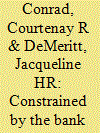

|
|
|
|
|
| Publication |
2013.
|
| Summary/Abstract |
Why does the discovery of oil lead to increased government repression in some countries and not others? Why is there variance in the extent to which democracy constrains state violations of human rights? We assume that an executive's propensity to use violence against citizens is a function of the extent to which he is dependent on his citizenry. Executives can be dependent on their citizenry in two ways: (1) at the bank for financial resources, and (2) at the ballot box for political support. We argue that these considerations jointly influence executive decisions to engage in state repression, and consequently, observed human rights abuse. Using a dataset of 146 countries from 1981 to 2011, we find that democratic institutions have a moderating effect on the positive relationship between unearned revenues and human rights violations. Decreased reliance on citizens for revenue does not weaken and may actually strengthen the pacifying effect of democratic institutions on state terror. Our results suggest that pursuing democracy is a useful way to reduce political violence, both directly and indirectly, even in the presence of a resource curse. Furthermore, the discovery of oil and other unearned revenues is unlikely to undermine the positive relationship between democratic institutions and domestic protections for human rights.
|
|
|
|
|
|
|
|
|
|
|
|
|
|
|
|
| 3 |
ID:
109585
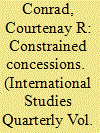

|
|
|
|
|
| Publication |
2011.
|
| Summary/Abstract |
Do domestic institutions affect how dictators respond to their political opposition? In this paper, I argue that institutionalization is key to understanding whether dictators respond to domestic opposition groups with concessions. I present a nominal typology of dictatorial opposition movements, arguing that the manner in which the opposition is incorporated into the regime reveals important information about the types of concessions dictators will likely provide. Using a system of endogenous equations, I show that dictators buy off some types of domestic opposition with material concessions and liberalize when they face other types of opposition. Because dictators often make decisions facing environmental constraints, however, I also argue that financial conditions can limit a dictator's ability to respond beneficently to the opposition.
|
|
|
|
|
|
|
|
|
|
|
|
|
|
|
|
| 4 |
ID:
120825
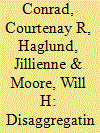

|
|
|
|
|
| Publication |
2013.
|
| Summary/Abstract |
The Ill-Treatment and Torture (ITT) Data Collection Project uses content analysis to measure allegations of government ill-treatment and torture made by Amnesty International (AI) from 1995 to 2005. ITT's country-year (CY) data quantify AI allegations of ill-treatment and torture at the country-year unit of observation and further across different responsible government agents and across different econo-socio-political groups of alleged victims. This paper introduces the Ill-Treatment and Torture country-year data, describes quantitative patterns likely to be of interest to researchers focused on the study of international non-governmental organizations (INGOs) and human rights, and suggests a number of theoretically motivated questions that can be explored using the ITT country-year data.
|
|
|
|
|
|
|
|
|
|
|
|
|
|
|
|
| 5 |
ID:
128959
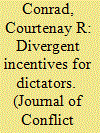

|
|
|
|
|
| Publication |
2014.
|
| Summary/Abstract |
Although they are arguably the worst violators of human rights, dictators sometimes commit to international human rights treaties like the United Nations Convention Against Torture (CAT) to appease their domestic opposition. Importantly, however, executives facing effective judiciaries must anticipate ex post costs that can arise when international treaties are likely to be enforced domestically. This suggests that one domestic institution-a political opposition party-may provide a dictator with incentives to commit to international human rights treaties and violate human rights, while another-an effective domestic judiciary-may constrain the dictator's ability to violate human rights and incentivize him to avoid international commitment. How do dictators make choices about commitment to human rights law and respect for human rights when they face conflicting domestic incentives? Furthermore, how do these divergent incentives affect compliance when dictators do commit to international treaties? In this article, I argue that the domestic incentives dictators face to support the CAT and engage in torture are moderated in countries with effective domestic judiciaries.
|
|
|
|
|
|
|
|
|
|
|
|
|
|
|
|
| 6 |
ID:
181859
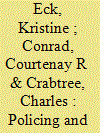

|
|
|
|
|
| Summary/Abstract |
The police are often key actors in conflict processes, yet there is little research on their role in the production of political violence. Previous research provides us with a limited understanding of the part the police play in preventing or mitigating the onset or escalation of conflict, in patterns of repression and resistance during conflict, and in the durability of peace after conflicts are resolved. By unpacking the role of state security actors and asking how the state assigns tasks among them—as well as the consequences of these decisions—we generate new research paths for scholars of conflict and policing. We review existing research in the field, highlighting recent findings, including those from the articles in this special issue. We conclude by arguing that the fields of policing and conflict research have much to gain from each other and by discussing future directions for policing research in conflict studies.
|
|
|
|
|
|
|
|
|
|
|
|
|
|
|
|
| 7 |
ID:
145086


|
|
|
|
|
| Summary/Abstract |
Although scholarly consensus suggests that dissent causes repression, the behaviors are endogenous: governments and dissidents act in expectation of each other’s behavior. Empirical studies have not accounted well for this endogeneity. We argue that preventive aspects of repression meaningfully affect the relationship between observed dissent and repression. When governments use preventive repression, the best response to dissent that does occur is unclear; observed dissent does not meaningfully predict responsive repression. By contrast, governments that do not engage in ex ante repression will be more likely to do it ex post. We follow U.S. voting scholarship and propose a new instrument to model the endogeneity: rainfall. We couple rainfall data in African provinces and U.S. states with data on dissent and repression and find that dissent fails to have a significant effect on responsive repression in states that engage in preventive repression.
|
|
|
|
|
|
|
|
|
|
|
|
|
|
|
|
| 8 |
ID:
132357
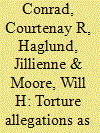

|
|
|
|
|
| Publication |
2014.
|
| Summary/Abstract |
The Ill-Treatment and Torture (ITT) Data Collection Project uses content analysis to measure a number of variables on more than 15,000 public allegations of government ill-treatment and torture made by Amnesty International (AI) from 1995 to 2005. The ITT specific allegation (SA) event data use the torture allegation as the unit of observation, thus permitting users to manipulate them for a wide variety of purposes. In this article, we introduce the ITT SA data. We first describe the key variables in the SA data and report a number of bivariate descriptive statistics to illustrate some of the research questions that might be usefully investigated with the data. We then discuss how we believe the ITT SA data can be used to study not only AI's naming and shaming behavior, but also states' (lack of) compliance with the United Nations Convention Against Torture (CAT). We conclude with an empirical analysis using the SA data that investigates the effect of domestic political institutions on formal complaints, investigations, and adjudication of torture allegations. We show that legislative checks are positively associated with complaints, investigations, and trials; elections and freedom of speech are positively associated with investigations and trials; and powerful judiciaries are associated only with investigations.
|
|
|
|
|
|
|
|
|
|
|
|
|
|
|
|
| 9 |
ID:
157580
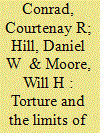

|
|
|
|
|
| Summary/Abstract |
What are the limits of democracy’s positive influence on human rights? In this article, we argue that contested elections and powerful courts provide leaders with different incentives with regard to hiding torture. Because government torture is generally targeted at individuals that voters find threatening, institutions that reflect public opinion – like electoral contestation – are associated with higher levels of government abuse that leave scars on the victim’s body. Other institutions – like powerful courts – protect the rights of political minorities. Leaders in countries with powerful courts prefer plausible deniability of rights violations and consequently employ higher levels of clean torture, which leaves no scars. We test our hypotheses using data from the Ill-Treatment and Torture (ITT) Data Collection Project that distinguish between Amnesty International (AI) allegations of scarring and clean torture. We employ an undercount negative binomial that accounts for AI’s (in)ability to obtain information about torture. The model assumes that some incidents of torture go unreported and allows the extent of underreporting to vary across countries/years. Estimates from the model yield considerable statistical and substantive support for our hypotheses.
|
|
|
|
|
|
|
|
|
|
|
|
|
|
|
|
| 10 |
ID:
134520
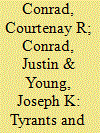

|
|
|
|
|
| Summary/Abstract |
Conventional wisdom suggests that reports of terrorism should be sparse in dictatorships, both because such violence is unlikely to result in policy change and because it is difficult to get reliable information on attacks. Yet, there is variance in the number of terrorist attacks reported in autocracies. Why? We argue that differences in the audience costs produced by dictatorships explain why some nondemocracies experience more terrorism than others. Terrorists are more likely to expect a response in dictatorships that generate high domestic audience costs. Using data from multiple terrorism databases, we find empirical evidence that dictatorships generating higher audience costs—military dictatorships, single-party dictatorships, and dynastic monarchies—experience as much terrorism as democracies, while autocracies generating lower audience costs—personalist dictatorships and non-dynastic monarchies—face fewer attacks than their democratic counterparts
|
|
|
|
|
|
|
|
|
|
|
|
|
|
|
|
|
|
|
|
|